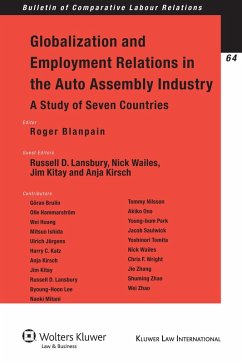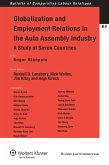The auto industry is a prime example of globalisation in which multinational enterprises have developed networks, alliances, and cross-shareholdings across regions and nations. This important studybased on a three-year empirical research project in seven countriesfocuses on employment relations in the auto assembly industry and shows that the influence of globalisation is tempered to varying degrees by institutional employment patterns at the local level. Twenty-one scholars and researchers representing all seven countries analyse the data, clearly describe the differences across both countries and firms, and offer conclusions and recommendations that greatly facilitate our understanding of the globalisation process at the level of human resources in industrial production. For each of the seven countriestwo liberal market economies (the United States and Australia), two coordinated market economies (Germany and Sweden), and three Asian market economies (Japan, South Korea, and China)the book describes five key issues in detail: work organisation; skill formation; remuneration systems; staffing arrangements and employment security; and enterprise governance and employeemanagement relations. The authors offer in-depth comparative analysis of these central issues in the context of such overriding factors as corporate strategy, local institutional constraints and advantages, competitive pressures among automakers to capture emerging markets, power relations within firms, and the role that agency and interests play in shaping social action. Whether this book is used for its vast bank of information, or for its deeply-informed analysis, or for its far-reaching relevance to employment relations policy, it more than fulfills the urgent need to come to grips with the runaway impact of globalisation on employment relations. Anyone involved with labour and employment issues in any business, legal, or governmental setting will rely on its findings and insights for years to come.
Dieser Download kann aus rechtlichen Gründen nur mit Rechnungsadresse in A, B, BG, CY, CZ, D, DK, EW, E, FIN, F, GR, HR, H, IRL, I, LT, L, LR, M, NL, PL, P, R, S, SLO, SK ausgeliefert werden.









